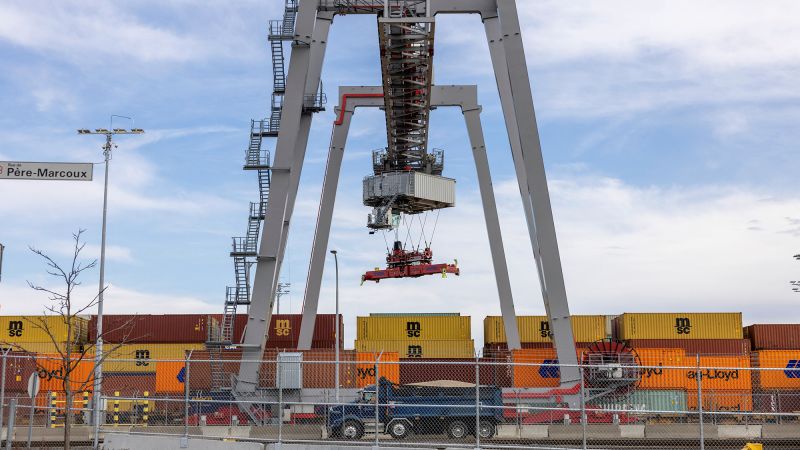President Donald Trump’s use of tariffs has been a defining feature of his administration’s trade policy, aimed at boosting U.S. manufacturing, restoring trade balance, and generating tax revenue. While the effectiveness of these tariffs in achieving such goals remains debated, Trump’s strategic use of tariff threats has occasionally proven successful in bringing other nations to the negotiating table.
The announcement comes as Trump has utilized tariffs not only as economic tools but also as diplomatic levers. By threatening tariffs, he has often compelled countries to reconsider their trade policies with the United States. Here are three notable instances where Trump’s tariff threats led to significant concessions.
Canada’s Digital Services Tax Reversal
One of the most recent examples occurred over the weekend when Canada decided to retract its planned digital services tax. This tax, which was set to affect online companies, including major U.S. corporations operating in Canada, was met with strong opposition from Trump. On Friday, he threatened to halt trade discussions with Canada and impose new tariffs by the end of the week.
By Sunday, Canada announced it would drop the tax, with Finance Minister François-Philippe Champagne stating, “To support those negotiations, the Minister of Finance and National Revenue announced today that Canada would rescind the Digital Services Tax (DST) in anticipation of a mutually beneficial comprehensive trade arrangement with the United States.”
On Monday, trade talks between the United States and Canada resumed, with Canadian Prime Minister Mark Carney emphasizing the importance of the negotiations, “It’s part of a bigger negotiation… We’re making progress toward a final deal.”
Colombia’s Agreement on Deportees
Another instance of Trump’s tariff threats impacting international relations occurred with Colombia. In late January, after Colombian President Gustavo Petro blocked U.S. military flights carrying undocumented migrants, Trump responded with a threat of imposing 25% tariffs on Colombian exports, potentially increasing to 50% if Colombia did not comply with accepting deportees.
The pressure led Colombia to quickly reverse its stance, agreeing to accept deported migrants. A Trump administration official commented, “You can’t go out there and publicly defy us in that way. We’re going to make sure the world knows they can’t get away with being nonserious and deceptive.”
The European Union’s Fast-Tracked Negotiations
In a similar vein, Trump’s dealings with the European Union showcased his use of tariffs as a negotiation tool. Citing stalled trade negotiations, Trump announced in late May that he would impose a 50% tariff on all EU goods. The announcement was made after he expressed frustration over the slow progress, stating on Truth Social, “Our discussions with them are going nowhere!”
However, just days later, European Commission President Ursula von der Leyen engaged with Trump, leading to a delay in the tariff deadline and a renewed commitment to fast-track a trade deal. Although a final agreement has yet to be reached, the threat was seen as a catalyst for the EU to take negotiations more seriously.
When Tariff Threats Fall Short
Despite these successes, Trump’s tariff threats have not always yielded the desired outcomes. The administration has often attributed increased corporate investments in the U.S. to tariffs, though the direct impact remains unclear. For example, after imposing tariffs on steel and aluminum, GE Appliances moved production from China to Kentucky, though the company noted that the decision predated the tariffs.
In other cases, such as with Apple and Samsung, Trump’s threats to impose tariffs on imported electronics failed to prompt the companies to shift manufacturing to the U.S. The complexity and cost of smartphone production in the U.S. were cited as barriers, with Trump’s demands potentially adding thousands of dollars to smartphone prices.
Similarly, a proposed 100% tariff on foreign-made movies left Hollywood executives puzzled, and the threat was eventually dismissed as a mere proposal. Nonetheless, it sparked discussions on incentivizing film production in California, with Governor Gavin Newsom expressing support for collaboration with the Trump administration.
Implications and Future Outlook
While Trump’s tariff threats have sometimes led to significant concessions, they have also sparked trade tensions and retaliatory measures. The approach has been a double-edged sword, occasionally achieving short-term gains but also risking long-term economic repercussions.
As global trade dynamics continue to evolve, the effectiveness of tariff threats as a diplomatic tool remains a subject of debate. Moving forward, the challenge will be balancing assertive trade policies with the need for stable international relations.
Ultimately, Trump’s use of tariffs underscores the complex interplay between economic policy and international diplomacy, highlighting the intricate strategies involved in navigating global trade.








































































